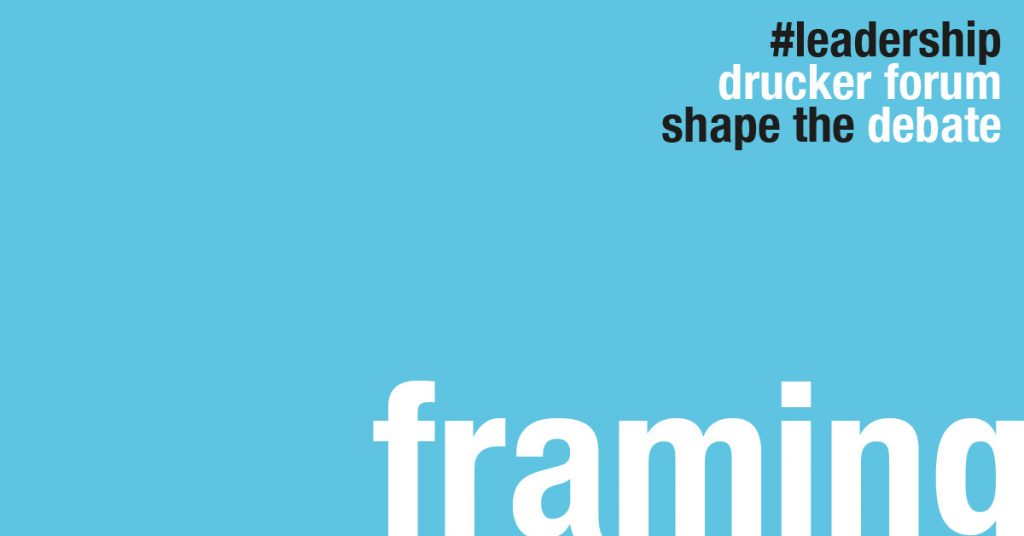
One of the most important developments in the field of psychology is the discovery that the workings of human thinking often enable inefficient and sometimes irrational expert judgments. Daniel Kahneman and Amos Tversky observed that the human brain is a paradox. While it is capable of producing highly developed analytical and creative intelligence, it is also prone to make apparently senseless errors.
Drucker Forum 2020
This paradox exists because they two psychologists discovered that people engage in two different thinking modes. They call these System 1 and System 2. System 1 is fast thinking, which operates automatically with little or no effort. It is highly proficient at identifying causal connections between events. System 2, on the other hand, is slow thinking and involves deliberate attention to understanding details and the complex web of relationships among various components. Whereas System 2 is rational, probabilistic and highly aware of uncertainty and doubt, System 1 is inherently intuitive, deterministic, undoubting, and prone to unconscious biases.
Both System 1 and System 2 are distinctly human capabilities that have provided humanity with an immense evolutionary advantage. However, in applying these two capabilities, Kahneman and Tversky found that, while we may perceive ourselves as predominately rational System 2 thinkers, the reality is most human judgments and decisions are based upon the more intuitive System 1.
The Influence of Framing
In employing System 1, Kahneman and Tversky found that how we frame a situation heavily influences how we decide between alternative courses of action. They noticed that people did not choose between things, but rather, they choose between descriptions of things. Thus, by simply changing the framing, they could cause people to completely flip their attitude on how to respond to a situation.
For example, in an experiment conducted at the Harvard Medical School, Tversky divided physicians into two groups. Each group was given statistics about the five year survival rates for the outcomes of two treatments for lung cancer: surgery and radiation. While the five-year survival rates were clearly higher for those who received surgery, in the short term surgery was riskier than radiation. The two groups were then given two different descriptions of the short term outcomes and were asked to choose the preferred treatment.
The first group was given the survival rate: The one-month survival rate is 90%. The second group was given the corresponding 10% mortality rate. Although these two descriptions are logically equivalent, 84% of physicians in the first group choose surgery while the second group was split 50%/50% between the two options.
If the preferences were completely rational, the physicians would make the same choice regardless of how the descriptions were framed. However, System 1 thinking is not rational and can be swayed by emotional words. Thus, while 90% survival sounds promising, 10% mortality is shocking. This troubled Kahneman who noted, “It is somewhat worrying that the officials who make decisions that affect everyone’s health can be swayed by such a superficial manipulation—but we must get used to the idea that even important decisions are influenced, if not governed, by System 1.”
Could this be true in how we are handling Covid-19? Is it possible that, despite claims of following the science, the guidance of public health experts is more likely governed by System 1 thinking?
Framing the Coronavirus
When the coronavirus first erupted into our lives, it was immediately framed as a public health crisis. But what if we had reframed the problem differently and treated
Covid-19 as a social system crisis? This reframing would have almost certainly given greater voice to advisors who were not public health experts. If the primary advisors were a diversity of medical, economic, and social science contributors, there would have been a greater opportunity to formulate a holistic solution to address the many dimensions of this social system crisis.
It is likely that a diversified group would have focused on balancing three goals. The first goal would be to minimize the number of deaths from Covid-19. A second goal would be to minimize the number of unintended deaths that might result from actions taken to curb the virus. And, finally, a third goal would almost certainly be to maintain social and economic cohesion to the fullest extent possible.
Better ways of thinking
If we had framed the pandemic as a social system crisis, we might have been able to avoid the hazards of experts by enabling System 2 thinking and crafting a more holistic solution to better respond to all aspects of a complex social problem. This is an important lesson for leaders as they face the wicked challenges posed by accelerating change and increasing complexity. The best guidance for avoiding the pitfalls of System 1 and enabling the more rational System 2 is to blend the voices of both experts and non-experts as a channel to discovering the creatively intelligent solutions needed to solve wicked problems.
About the Author:
Rod Collins (@collinsrod) is the Chief Innovation Facilitator at Salt Flats and the author of Wiki Management: A Revolutionary New Model for a Rapidly Changing and Collaborative World.
This article is one in the “shape the debate” series relating to the fully digital 12th Global Peter Drucker Forum, under the theme “Leadership Everywhere” on October 28, 29 & 30, 2020.
#DruckerForum


Loved this article!